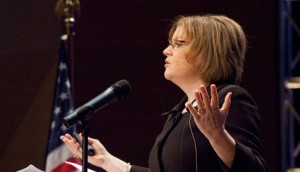Podcast: Download (Duration: 12:08 — 13.9MB)
As a forensic accountant who specializes in fraud investigations, Tiffany Couch’s job is to offer a neutral eye and follow the paper trail – often to surprising results.
That was certainly true this fall when Couch’s firm, Acuity Group PLLC, became the target of a lawsuit filed by Portland firm David Evans and Associates, the lead contractor responsible for the creation of the final environmental impact statement for the $10 billion* Columbia River Crossing Light Rail project (CRC).

Vancouver-based forensic accountant Tiffany Couch and her firm were the target of a surprising lawsuit from chief CRC contractor David Evans and Associates.
The project is a joint venture of the Oregon and Washington Departments of Transportation (ODOT and WSDOT), which have been overseeing the project for six years out of an office building in downtown Vancouver. WSDOT hired David Evans in 2005 to shepherd the environmental phase of the project.
Couch, who started her firm in 2007, first became involved with the CRC in February of 2011 when she learned that local businessman David Madore had requested financial documents from the CRC office through a public documents request. Madore owns Vancouver-based US Digital and invests in startups including COUV.COM. He wanted to understand how much money the project was costing taxpayers, but the 714 individual files he received contained thousands of pages of unorganized financial data. Couch read about Madore’s plight in a newspaper article and contacted him, offering to help. When she saw the deluge of documents herself, she realized what the problem was.
“Quite literally, when you would open up the files, it didn’t appear that the documents really had any relation to each other, for example, dates or vendors,” Couch said. “They really were in complete disarray.”
In April, Madore invited Couch to join him in a face-to-face meeting with CRC staff to get more general financial statements that would provide an overview of the project.
The meeting was, to say the least, a surprise. There were half a dozen people or more in to greet them, plus another group on the phone from Olympia.
“Generally, if you’re just there to have a meeting and ask some very simple questions, you meet with a few people from the organization,” said Couch. “But to have 12 people meeting with us all – I wasn’t intimidated, but it just seemed excessive.”
Even more surprising to Couch was that even though the CRC staff wanted to walk her through a detailed amount of spreadsheets, they couldn’t provide her with a basic financial statement for the project. She wanted to see a statement of net assets and statement of activities.
They didn’t have them.
“Accounting is really simple,” Couch said. “Why don’t we have simple reports so that people can make decisions? So I was concerned and surprised that there wasn’t better reporting coming out of that office, or from WSDOT or ODOT.”
After the April meeting, Couch hired employee Debbie Petersen to organize the documents Madore had.
The information covered expenditures up to Feb 8, 2011. WSDOT had spent $108 million on the CRC project, with $15 million in payments listed without a vendor name. In October, Couch received an updated report from the CRC that went through June 2011. It said WSDOT had spent $125 million since the project’s inception in 2005. A total of $18 million still had no vendor name.
Couch guesses that these payments may have gone to payroll and rent, but the lack of clarity was odd.
“It’s a problem that you have $18 million, a little less than 10 percent of your expenditures, without any audit trail,” Couch said.
Couch learned that David Evans had been the only company to submit a proposal to lead the project’s environmental phase, originally slated to cost more than $20 million.
However, David Evans signed a contract for $50 million. That contract was later increased to $110 million with no apparent change in job scope. According to Couch, David Evans also tacked on an additional 4 percent surcharge on top of the amounts vendors listed on their invoices until told to stop the practice in 2009.
Couch’s firm came under fire when Petersen suggested they request an audited financial statement of David Evans and Associates’ work on the project from WSDOT.
The next thing Couch knew, David Evans had filed suit against Petersen and WSDOT seeking a restraining order on the release of the requested documents. Couch’s lawyers said it would be an expensive fight, so she decided not to pursue it.
“I thought, you know, as a CPA, I know what’s in an audited financial statement and what’s not,” Couch said. “And I can see coming down the line some other documents I’m going to want. And I thought if they’re going to react to something so basic, what are they going to react to when I’m asking for some other detailed documents, and do we need to save some of our precious legal fees on potential future matters?”
What happened next surprised her even more. When attorneys for David Evans wrote a letter saying that all parties agreed that the requested documents wouldn’t be released, they included a document never mentioned in the lawsuit. They referenced so-called “overhead audits,” not the audited financial statements Couch had asked for. Couch refused to sign the letter.
“This whole time we had asked for audited financial statements,” she said. “They sued us and said we couldn’t have audited financial statements. We were clear in our terminology. They were clear in their terminology what we were all arguing about. So, to now write up something that a judge is going to sign for a document we never asked for doesn’t make any sense.”
Ultimately, David Evans agreed to drop the matter and the lawsuit evaporated.
With that legal hurdle over, Couch remains busier than ever – which doesn’t bode well for anyone trying to hide money they shouldn’t.
“My business is pretty recession proof,” she said.
* The well-documented cost to taxpayers, if the CRC stays on budget, is $10 billion. This was established by the Cortright Report (PDF) which used data from an independent review panel hired by the governors of Washington and Oregon. (View the panel’s final report.)
See our continuing coverage of the Columbia River Crossing Light Rail project.
Do you have information to share on the CRC? To respond anonymously call 260-816-1426. To allow your comments to be used on COUV.COM call 260-816-1429.









